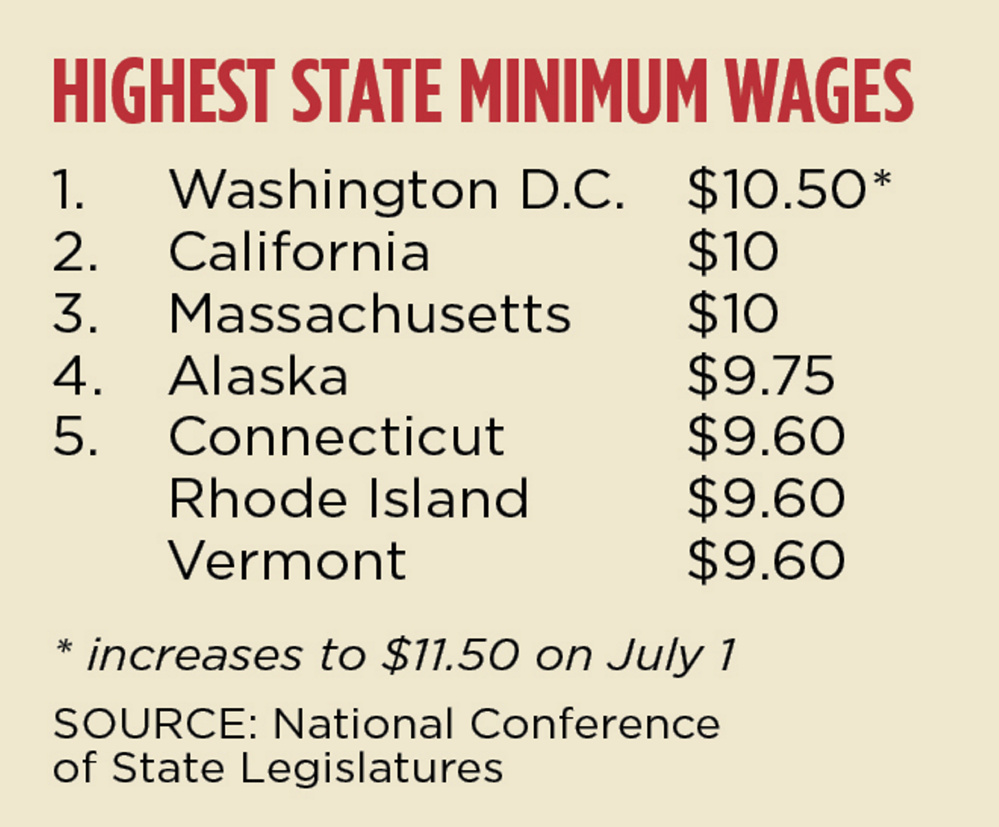AUGUSTA — Business groups plan to unveil a proposal Wednesday for a $10-an-hour minimum wage by 2020, a move that critics are attacking as “back-room legislative maneuvering” to weaken support for a November referendum on a $12-an-hour minimum.
Mainers will vote this fall on a ballot initiative to raise the state’s minimum wage from $7.50 to $9 an hour in 2017, followed by annual increases to $12 an hour by 2020. A coalition of business groups hopes to use the “competing measure” option allowed under the Maine Constitution to propose an $8.50 hourly wage in 2017 with 50-cent annual increases to $10 an hour by 2020.
The business groups will detail their plan Wednesday as they seek legislative approval to place a competing measure on the ballot. The effort prompted backers of the $12-an-hour campaign to hold an event Monday and accuse “corporate lobbyists” of attempting an end run around their ballot initiative.
“The competing measure is a smoke screen,” said Mike Tipping, spokesman for the Maine People’s Alliance, the grass-roots group that helped lead the signature-gathering drive to place the $12-an-hour initiative on the ballot. “The lobby groups proposing it actually oppose increasing the minimum wage. They have opposed it and this is an attempt to use (the referendum) as a tactic to confuse and delay.”
Peter Gore, vice president of the Maine State Chamber of Commerce, called any talk of a back-room deal “preposterous” because the constitution allows lawmakers to offer an alternative proposal to any citizens’ initiative. Members of the business coalition – including the Maine Restaurant Association, the Retail Association of Maine and the Maine Innkeepers Association – support a higher minimum wage, but not to the level sought by Tipping’s campaign, Gore said.
“We believe that there should be a more reasonable alternative laid out for the Maine public to vote on,” Gore said. “That’s the process. There is absolutely nothing back-room about it and to suggest otherwise is offensive.”
Polls consistently show that Maine residents support increasing the state’s minimum wage, which is 25 cents higher than the federal minimum and has not changed since October 2009.
The Maine People’s Alliance, the Maine AFL-CIO and the Maine Small Business Coalition gathered more than 75,000 signatures to place their $12-an-hour wage proposal on the ballot. The organizations ramped up the citizens’ initiative drive after the Legislature failed to approve any of several minimum wage bills last year that proposed a range of increases, to $8 an hour and up to $12.
Although the full details of the business coalition’s proposal are not yet public, Gore said it will contain several other key differences from the ballot initiative spearheaded by the Maine People’s Alliance. The coalition proposal wouldn’t index the minimum wage to inflation and wouldn’t phase out the “tip credit” that allows restaurant owners to pay lower hourly wages to food servers, bartenders or other tipped employees.
It is unclear whether the business coalition’s proposal will have enough legislative support to pass given the election-year politics involved in the issue on both sides of the aisle. Many Democrats who support the $12-an-hour referendum are likely to oppose the competing measure, while some Republicans are likely to oppose any minimum wage increase.
John Costin, the owner of Veneer Services Unlimited in Kennebunk and a board member of the progressive Maine Small Business Coalition, said the business coalition’s proposal was only aimed at “delaying and derailing” any wage hike.
“If they actually wanted to raise the minimum wage, they could have supported it last year when there were eight separate bills put forward to raise it,” Costin said. “Instead, they opposed every single one of them.”
Gore said coalition members are committed to supporting their proposal – if it makes it onto the ballot – as an alternative to the current ballot initiative that would give Maine one of the highest minimum wages in the country.
“For many in the small-business community, that’s not bearable,” Gore said of a $12-an-hour minimum wage. “That is too high for them.”
Send questions/comments to the editors.



